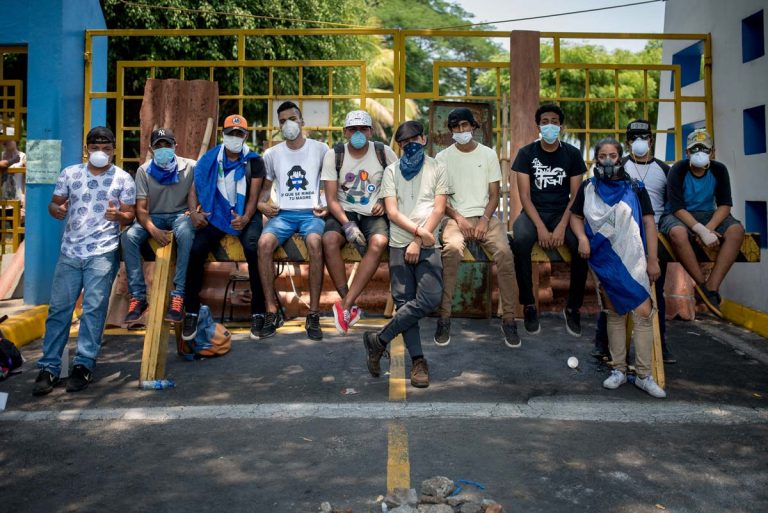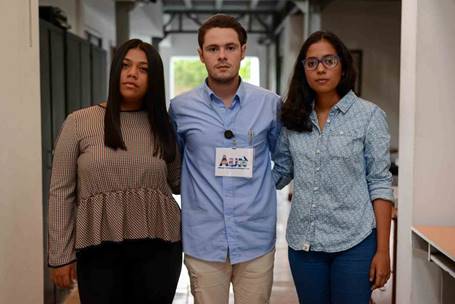4 de junio 2018

The Return of the Military

PUBLICIDAD 1M
PUBLICIDAD 4D
PUBLICIDAD 5D
What are the protective measures recommended by the Inter-American Commission for Human Rights and what is their purpose?

A precautionary measure puts the State under an obligation to use its security apparatus to protect the people that the measure covers.” Carlos Herrera | Confidencial
During their recent visit and investigation, the Inter-American Commission for Human Rights (IACHR) requested that the Nicaraguan State adopt precautionary measures to guarantee the security of the 13 young people from different student movements who have participated in the National Dialogue.
The IACHR is an autonomous organ of the Organization of American States (OAS) that is charged with promoting the observation and defense of human rights. They define these precautionary measures as “an effective instrument of protection and prevention in the face of possible serious and irreparable harm to people or groups of people who face situations of imminent risk.” However, the IACHR lacks authority to exercise justice or to force the government to comply with these measures.
“A precautionary measure puts the State, through their organs of security – in this case the National Police – under the obligation of protecting the people who are covered by the measure.” Nevertheless, “the State can decide not to accept them,” explained Felix Maradiaga, political scientist and director of the Institute for Strategic Studies and Public Policies.
If the government adopts the measures, the State, through the Foreign Ministry then invites the beneficiaries to a meeting to agree on the mechanisms that the beneficiaries feel are adequate to guarantee their safety, stated Vilma Nunez, president of the Nicaraguan Human Rights Center.
“The State can’t unilaterally declare that they’re going to shadow them with a security patrol, or that a police officer is going to watch their houses. They (the beneficiaries) must decide what they need for their security and what the Government should commit to doing,” she elaborated.
If any of the youth have been threatened by telephone, the police should order Telcor (the state-owned communications company) or the corresponding service provider to immediately block that line of communication, Nunez added.
Nevertheless, Felix Maradiaga admitted that the problem is that the government has lost control of its structures and there are many “fanatical” police who “aren’t acting according to a rational chain of command.”
Although the ideal would be for the beneficiaries to be protected by the National Police as has occurred in other countries, Vilma Nunez felt that in Nicaragua they could act as “spies” and not as guarantors of security. She affirmed that one form of guaranteeing the safety of the young people would be for the Government to comply with the first recommendations of the IACHR: an end to repression and the dismounting of the organized paramilitary bodies.
The recommended measures also oblige the State to desist from any attempt at legal reprisals against the 13 youth, and to guarantee their free participation in the different scenarios of public debate.
The precautionary measures are tailored to the measure of each case, as is the time period over which they remain valid. In the case of the measures recommended for the young students, the IACHR has emitted them for an indefinite period.

Left to right: Valeska Valle, Fernando Sanchez, Enrieth Martinez. Youth participating in the National Dialogue. Photo: Wilfredo Miranda
“The IACHR can’t force compliance with the precautionary measures,” explained Maradiaga, but if they are rejected: “the State once more reveals itself as one that doesn’t uphold human rights.”
Vilma Nunez says such a failure to comply would contribute to reinforcing on an international level “the image of an abusive state,” that Nicaragua already possesses. “Having a national human rights organization say it isn’t the same as having it come from the IACHR,” she underlined.
The IACHR could appeal to the InterAmerican Human Rights Court in Costa Rica, asking that they dictate provisional measures to bring about greater compliance on the part of the State that was the center of international focus. To Nunez, that could be a trigger for other organizations to impose strong sanctions against the Nicaraguan State.
For his part, Maradiaga doubted that the government would directly injure the youth who are beneficiaries of the protective measures, since he believes that the State would then open itself up to “an explosion of national indignation and rage,” similar or greater than that which took place when journalist Pedro Joaquin Chamorro was assassinated in 1978.
“The students have the moral backing of the people, and their status as national symbols generates a certain level of protection,” he noted.
Vilma Nunez confirmed that if in the space of a week the State doesn’t respond to the request to comply with the precautionary measures, the Nicaraguan Human Rights Center will send a report to the IACHR.
PUBLICIDAD 3M
Periodista y productor general de los programas Esta Semana, Esta Noche y Confidencial Radio, dirigidos por Carlos F. Chamorro. Exiliado en Costa Rica desde junio de 2021.
PUBLICIDAD 3D